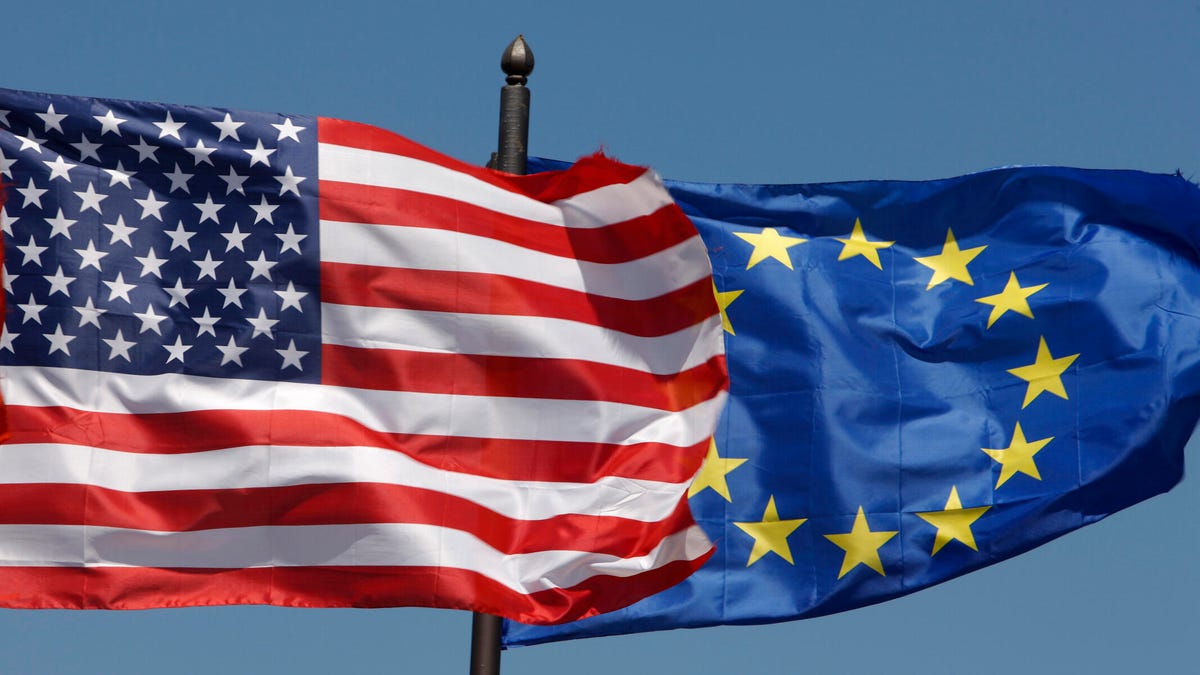Europe is so not done regulating Google and other US tech giants
The third outstanding antitrust case involving Google was finally resolved in 2019, but the EU has a whole new set of targets in its sights.

Europe and the US have taken different approaches to regulating tech.
The US is edging ever closer to regulating its giant, world-famous tech companies. But even as lawmakers in DC spar with the likes of Google and Facebook over potential overreach, European regulators have already been busy. And there are no signs of stopping next year.
It was a landmark year in 2018 after the EU handed down its largest fine ever on Google (totaling $5 billion) and introduced a strict privacy law, the GDPR
This year has been comparatively drama-free -- it's been mostly tying up loose ends, feeling out new problems and kicking the enforcement of GDPR up a couple of notches with bigger and more frequent fines. The most notable moment was the resolution of the EU's final antitrust investigation into Google (over AdSense) in March, resulting in a third multibillion-dollar fine in three years.
But that doesn't mean EU regulation of big tech has peaked -- keep your eyes peeled for more tension to come in 2020 and beyond. This year hasn't exactly been the quiet before the storm, but tech giants should be prepared for even more regulatory scrutiny.
One factor contributing to the modest nature of this year's regulatory efforts is the transitional state of the leadership of the European Commission. European Competition Commissioner Margrethe Vestager -- the Danish politician responsible for overseeing a roster of big antitrust fines -- narrowly missed out on being elected Commission president. So she's back to serve a second term overseeing competition in the EU.
Vestager will now serve a second term as Competition Commissioner.
For the past five years, Vestager has been a thorn in the side of Silicon Valley, conducting high-profile investigations into the business practices of US tech giants and handing out billions of dollars in fines.
Vestager's failed bid to become the new European Commission president means she remains in the driver's seat at the Competition Commission, but now with additional responsibilities as executive vice president of the commission in charge of digital, giving her more power than ever. In her expanded role, she will continue to conduct antitrust investigations, but will also spend time reassessing how competition law is applied and oversee the project to ensure the EU is fit for the digital age.
In her time as commissioner she's made some big enemies -- and they don't come much bigger than US President Donald Trump. The president has claimed that Vestager "hates" America and has lashed out at her investigations and decisions regarding US tech companies.
Trump suggested to Fox News in June that the US should be allowed to regulate its own companies, but that Europe should not. But for as long as those companies continue to have headquarters in Europe, operate in European countries and collect profits in those markets, they will continue to be required to abide by EU law.
In the face of Trump's barely veiled insults, Vestager has remained calm, collected and logical, stating time and again her belief in sustaining environments in which innovation is allowed to flourish. "This has nothing to do with what I feel, nothing whatsoever," she said in response to Trump's comments while delivering her verdict on Google in March. "The mission is very simple, we have to protect consumers and competition."
Not the first time Trump says @Vestager hates the United States. But she is not easily impressed.
— Pablo Pérez (@PabloPerezA) June 26, 2019
"I've done my own fact-checking (..) I very much like the US".
"The mission is very simple, we have to protect consumers and competition in the EU". pic.twitter.com/KzTKAMqknu
Starting in 2018 and continuing through 2019, a burgeoning chorus of voices has been calling for the breakup of big technology companies, in particular of Facebook. But Vestager has warned against breakups, pointing out that there's no model for doing so and that breakups may not offer solutions to current problems. Breaking up a company, she said in May at Vivatech in Paris, would be "a last resort."
For Vestager, dominance of companies such as Facebook isn't problematic -- she's said on many occasions she applauds companies that are able to elevate themselves to dominant positions in the market. It is abuse of that dominance, which in stifling innovation breaks competition law and punishes consumers, that serves as the sole focus of her investigations.
This line she's drawn in the sand between dominance and abuse is the line that big tech companies dance around, and while they do, they'll be subject to close scrutiny by the EU Competition Commission.
In 2019 the EU added the following cases to its watch list:
- Google's data-protection practices
- Apple Music, following a complaint lodged by Spotify
- Facebook's Libra cryptocurrency
- Google's job search service
Not all of these are open investigations. In some cases, the EU is simply in the process of inviting people to submit evidence or complaints. But even the companies that are already directly under the microscope right now shouldn't expect a speedy resolution. Typically EU antitrust investigations take years to conclude, with tech companies dragging them out longer with appeals if the ruling doesn't go their way.
Regardless of whether the US chooses to align with Europe on regulation, the bloc's influence is substantial. The decisions being taken now, and those that will be taken in the near future, will forge the environment in which tomorrow's tech companies will spring up and thrive -- whether they're based in Europe, the US or the wider world. In the meantime, the US will likely play catchup designing its own regulation, meaning that to succeed in tech, companies will have to work out how to play nice on both sides of the pond.

